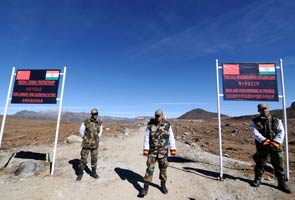21 aug 2013
New Delhi: In a repeat of the April incident in Ladakh, Chinese troops reportedly
intruded into Arunachal Pradesh at two places last week. Army and police
sources have confirmed that they camped for at least three to four days
in one area, about 20 km within Indian territory.
The first intrusion in Arunachal Pradesh was discovered by the Indian Army on August 11 at Plam Plam, a high-altitude, sparsely-populated and very remote area. The second was a few kilometres away on the Hadig La pass, just two days ago.
News of these incursions comes as India landed a C-130J Super Hercules transport plane at an airstrip in Daulat Beg Oldie near the Line of Actual Control (LAC) in Ladakh, the site of the India-China stand-off in April, in a flexing of muscle before border talks.
Sources said when the Indian troops chanced upon the
Chinese soldiers camped at Plam Plam, they made a tactical retreat to
come back with a reinforced patrol. But before they did, the Chinese
soldiers told them, through interpreters present in both patrols, that
they were building a track to Kapatu, about 20 km into what India
considers its territory.
They also said that they had been coming into the area for the last 12 years, since 2001.
The Indian Army launched a reinforced patrol on August 15, which went back to Plam Plam to find that the Chinese troops had withdrawn. But on August 19, they ran into a different group of Chinese soldiers in Hadig la. This group did not camp on Indian territory and withdrew immediately. As did the Indian troops.
"We don't take up non-events in diplomatic practice. The Army has refuted it," said Syed Akbaruddin, spokesperson in the Ministry of External Affairs.
However, the Army is tight-lipped and only said, "We patrol up to our area of perception, the Chinese troops patrol up to their area of perception."
China for many years claimed entire Arunachal Pradesh as its own territory. There have been intrusions in the past, but the Chinese have always gone back immediately. This was the first time a camp was discovered in recent times in Arunachal, much like the one in Ladakh in April, when the Chinese camped for 21 days in Depsang leading to diplomatic tension for days, which was de-escalated after many rounds of talks and tough negotiations.
China provokes India again, its troops enter Arunachal Pradesh and camp for 3-4 days: reports
 |
Dr Sanjay Kumar Cardiac Cardiothoracic Heart Surgeon India |
Click to Expand & PlayFile pic: Indian Army personnel at the India-China border in Arunachal Pradesh
The first intrusion in Arunachal Pradesh was discovered by the Indian Army on August 11 at Plam Plam, a high-altitude, sparsely-populated and very remote area. The second was a few kilometres away on the Hadig La pass, just two days ago.
News of these incursions comes as India landed a C-130J Super Hercules transport plane at an airstrip in Daulat Beg Oldie near the Line of Actual Control (LAC) in Ladakh, the site of the India-China stand-off in April, in a flexing of muscle before border talks.
They also said that they had been coming into the area for the last 12 years, since 2001.
The Indian Army launched a reinforced patrol on August 15, which went back to Plam Plam to find that the Chinese troops had withdrawn. But on August 19, they ran into a different group of Chinese soldiers in Hadig la. This group did not camp on Indian territory and withdrew immediately. As did the Indian troops.
"We don't take up non-events in diplomatic practice. The Army has refuted it," said Syed Akbaruddin, spokesperson in the Ministry of External Affairs.
However, the Army is tight-lipped and only said, "We patrol up to our area of perception, the Chinese troops patrol up to their area of perception."
China for many years claimed entire Arunachal Pradesh as its own territory. There have been intrusions in the past, but the Chinese have always gone back immediately. This was the first time a camp was discovered in recent times in Arunachal, much like the one in Ladakh in April, when the Chinese camped for 21 days in Depsang leading to diplomatic tension for days, which was de-escalated after many rounds of talks and tough negotiations.
No comments:
Post a Comment